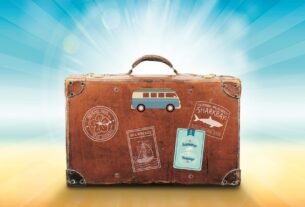Traveling is a wonderful way to explore new places, meet new people, and create unforgettable memories. However, it can also be expensive and stressful if not planned properly. Minimalist travel, which emphasizes packing light and managing expenses efficiently, can help make your journey more enjoyable and budget-friendly. In this blog, we’ll delve into how you can travel on a budget while embracing minimalism, ensuring you save money and pack light without compromising on your travel experience.
What is Minimalist Travel?
Minimalist travel is a philosophy that encourages travelers to simplify their trips by reducing the number of items they bring and focusing on what’s truly important. This approach involves packing only the essentials, making conscious choices to avoid unnecessary expenses, and embracing experiences over material possessions. The benefits of minimalist travel are numerous:
Less Stress and Hassle
Traveling with fewer belongings means you have less to worry about. You will avoid the stress of managing multiple bags, paying for extra baggage fees, and dealing with lost or delayed luggage. This simplification leads to a more relaxed and enjoyable travel experience.
Significant Cost Savings
By minimizing what you carry, you avoid extra costs associated with checked baggage and additional travel gear. Minimalist travel also encourages smarter spending, helping you save money on items you don’t need and focusing on experiences that matter.
Improved Mobility
Lightweight luggage makes it easier to navigate airports, train stations, and city streets. Whether you are carrying a single backpack or rolling a small suitcase, you will find moving from one place to another much more manageable without heavy or cumbersome bags.
Enhanced Travel Experience
Traveling light allows you to be more present and engaged with your surroundings. You will spend less time worrying about your belongings and more time enjoying your destination, leading to a richer and more meaningful travel experience.
Planning Your Budget-Friendly Trip
Choosing Affordable Destinations
The cost of traveling can vary significantly depending on your destination. To save money, consider choosing destinations known for their affordability. Here are a few budget-friendly regions to explore:
- Southeast Asia: Countries like Thailand, Vietnam, and Cambodia offer low costs of living and affordable travel options. You will find beautiful beaches, vibrant cities, and rich cultural experiences without breaking the bank.
- Eastern Europe: Nations such as Poland, Hungary, and Romania provide a more budget-friendly alternative to Western Europe. These destinations offer historical sites, charming cities, and lower prices on food, accommodation, and activities.
- South America: Peru, Bolivia, and Colombia are excellent choices for budget travelers. These countries offer diverse landscapes, from mountains to beaches, and a range of affordable travel experiences.
When selecting your destination, consider the cost of flights, accommodation, and daily expenses to ensure it fits within your budget.
Traveling During Off-Peak Seasons
Traveling during off-peak seasons can significantly reduce your expenses. During these times, flights, accommodation, and activities are often cheaper, and you will encounter fewer tourists. For instance, traveling to Europe in the winter or visiting Southeast Asia during the rainy season can result in lower costs and a more relaxed experience.
Booking in Advance
Booking your flights, accommodation, and activities well in advance is a key strategy for saving money. Early bookings often come with lower prices and special deals. Use comparison websites and set up price alerts to monitor fluctuations and secure the best rates. Additionally, consider booking non-refundable options for further savings if your plans are firm.
Using Public Transportation
Opting for public transportation instead of taxis or car rentals can greatly reduce your travel costs. Buses, trains, and bicycles are often more affordable and provide an authentic way to experience your destination. Many cities offer transit passes that allow unlimited rides for a set period, which can be a cost-effective option if you plan to use public transportation frequently.
Finding Free or Low-Cost Attractions
Exploring free or low-cost attractions is a great way to enjoy your destination without overspending. Look for public parks, beaches, museums with free admission days, and cultural sites that don’t charge an entrance fee. Many cities also host free events, festivals, and concerts that can add to your travel experience without adding to your expenses.
Packing Light for Minimalist Travel
Creating a Packing List
A packing list is essential for minimalist travel. Start by listing everything you think you will need, then review and refine it to focus on the essentials. Consider the climate, the activities you will be doing, and the duration of your trip. Prioritize items that are versatile and can serve multiple purposes.
Selecting Versatile Clothing
When packing, choose clothing that can be easily mixed and matched to create different outfits. Opt for neutral colors and simple designs that can be combined in various ways. Lightweight and quick-drying fabrics are ideal, as they are easier to wash and dry. Avoid bringing items that you will only wear once or that don’t match with other pieces.
Packing Travel-Sized Toiletries
Travel-sized toiletries are a must for minimalist packing. Small bottles of shampoo, conditioner, soap, and other personal care items save space and comply with airline regulations for carry-on liquids. If you prefer to reduce waste, consider purchasing these items at your destination or using solid alternatives like bar soap and shampoo bars.
Wearing Bulky Items
To maximize space in your luggage, wear your bulkiest items during your flight or while traveling. This includes jackets, sweaters, and heavy shoes. Not only does this free up room in your bag, but it also keeps you comfortable during your journey. Additionally, this strategy helps prevent the need for bulky items in your luggage, making it easier to manage.
Using a Lightweight, Durable Backpack
A high-quality backpack is essential for minimalist travel. Choose one that is lightweight, durable, and comfortable to carry. Look for features such as adjustable straps, multiple compartments, and water-resistant materials to enhance your travel experience. A well-designed backpack helps keep your belongings organized and easily accessible.
Packing Efficiently
Pack your items in a way that maximizes space and minimizes wrinkles. Use packing cubes or compression bags to organize your belongings and compress your clothes. Roll your clothes instead of folding them to save space and reduce creases. Place frequently used items in easily accessible compartments and keep valuable items in a secure, easily reachable pocket.
Saving Money on Accommodation and Food
Finding Budget Accommodations
Affordable accommodations are crucial for budget-friendly travel. Consider options such as hostels, guesthouses, and budget hotels, which often offer lower rates compared to luxury hotels. Platforms like Airbnb can provide a range of affordable lodging options, including private rooms, shared apartments, and even entire homes. Staying in accommodations with kitchen facilities allows you to prepare your own meals, further reducing food expenses.
Cooking Your Own Meals
If your accommodation includes kitchen facilities, take advantage of them by cooking your own meals. This approach is not only more affordable but also allows you to enjoy a more personalized dining experience. Visit local markets to purchase fresh ingredients and try regional specialties. Cooking at home also provides the opportunity to experiment with new recipes and enjoy meals at your own pace.
Eating Like a Local
Eating out at local restaurants and street food stalls can be both affordable and enjoyable. Local markets and food vendors often offer authentic and budget-friendly meal options. Ask locals for recommendations to discover hidden gems and unique culinary experiences. Avoid tourist-heavy areas where prices tend to be higher, and seek out neighborhoods where locals dine.
Utilizing Travel Reward Programs
Travel reward programs can offer valuable savings on flights, accommodation, and other travel expenses. Sign up for loyalty programs offered by airlines, hotels, and credit card companies to earn points or miles that can be redeemed for future travel. Keep an eye out for special promotions, offers, and bonuses that can further enhance your savings.
Entertainment and Activities on a Budget
Exploring Free or Low-Cost Activities
Many destinations offer free or low-cost activities that can enrich your travel experience. Explore public parks, beaches, and cultural sites that don’t require an entrance fee. Many cities also have free events, festivals, and concerts that you can enjoy. Research local happenings and take advantage of opportunities to experience your destination without spending a lot of money.
Enjoying Outdoor Adventures
Outdoor activities are often enjoyable and affordable. Hiking, swimming, and exploring nature reserves provide opportunities to experience the natural beauty of your destination at minimal cost. Check out local trails, scenic viewpoints, and parks to find activities that align with your interests. Outdoor adventures also offer a great way to stay active and enjoy fresh air during your trip.
Using Discount Passes
Discount passes for tourists can help you save money on attractions, transportation, and activities. Many cities offer passes that grant access to multiple sights and offer discounts at local businesses. Research and purchase these passes in advance to make the most of your visit and enjoy various attractions at a reduced cost.
Participating in Free Walking Tours
Free walking tours are a fantastic way to explore a city and learn about its history and culture without spending a lot of money. Many cities offer free guided tours led by knowledgeable locals. While these tours are often free, it’s customary to give a tip at the end if you enjoyed the experience.
Additional Money-Saving Tips
Setting a Travel Budget
Establishing a budget before you embark on your trip is crucial for managing expenses. Determine how much you want to spend on accommodation, food, transportation, activities, and other costs. Keeping track of your spending during the trip helps you stay within your budget and avoid unexpected expenses. Use budgeting apps or spreadsheets to monitor your expenses and make adjustments as needed.
Avoiding Tourist Traps
Tourist-heavy areas often have inflated prices for food, souvenirs, and attractions. To save money, explore less crowded neighborhoods and seek out local markets and hidden gems. This approach not only helps you find better value but also provides a more authentic travel experience.
Using Cash for Better Control
Paying with cash can help you manage your expenses more effectively. It’s easier to see how much you are spending and avoid impulse purchases. Some establishments may even offer discounts for cash payments, so carrying a reasonable amount of local currency can be beneficial.
Travelling with a Companion
Travelling with a friend or partner can help reduce costs by sharing expenses for accommodation, food, and transportation. It can also enhance your travel experience by providing companionship and shared memories. Make sure to communicate openly about budget preferences and travel plans to ensure a smooth trip.
Planning Meals in Advance
Planning your meals can help you stick to your budget and avoid expensive dining options. Research local dining options, make a list of affordable restaurants and food stalls, and consider preparing some meals yourself. Planning ahead helps you make informed choices and manage your expenses effectively.
Tracking Expenses
Regularly tracking your expenses during your trip is essential for staying on budget. Use a budgeting app or a simple spreadsheet to record your spending and identify areas where you can save. Reviewing your expenses frequently helps you make adjustments and ensure you stay within your financial limits.
Embracing Minimalist Travel: Final Thoughts
Traveling doesn’t have to be a costly or complicated endeavor. By embracing minimalist travel, you can simplify your journey, save money, and focus on what truly matters – exploring new places and creating lasting memories. Minimalist travel encourages thoughtful planning, smart spending, and a focus on experiences rather than material possessions.
To make the most of your minimalist journey, prioritize and simplify your travel plans. Choose destinations that fit your budget, pack light, and be mindful of your expenses. Enjoy the freedom that comes with traveling light and immerse yourself in the experiences that matter most.
Safe travels, and may your minimalist adventure be both enriching and budget-friendly!
FAQs on Budget-Friendly Minimalist Travel
- What is minimalist travel?
Minimalist travel focuses on simplifying your journey by packing light and bringing only the essentials. This approach reduces stress, saves money, and enhances your travel experience by allowing you to concentrate on enjoying your destination rather than managing a lot of belongings.
- How can I pack light for my trip?
To pack light, start by creating a packing list and focusing on versatile clothing that can be mixed and matched. Use travel-sized toiletries and wear your bulkiest items during your flight. Choose a lightweight, durable backpack to keep your belongings organized and easily accessible.
- How can I find budget-friendly accommodations?
Look for budget accommodations such as hostels, guesthouses, and budget hotels. Platforms like Airbnb offer a range of affordable options, including private rooms and shared apartments. Consider staying in places with kitchen facilities to save on food expenses by cooking your own meals.
- What are some affordable travel destinations?
Destinations with lower costs of living include Southeast Asia (Thailand, Vietnam, Cambodia), Eastern Europe (Poland, Hungary, Romania), and South America (Peru, Bolivia, Colombia). These regions offer beautiful landscapes and affordable travel experiences.
- How can I save money on food while traveling?
Save money by cooking your own meals if your accommodation has kitchen facilities. Eat like a local by trying street food and local markets, and avoid expensive restaurants. Research dining options and look for deals and discounts to manage your food expenses.
- What are some free or low-cost activities to do while traveling?
Explore free attractions such as public parks, beaches, and cultural sites. Enjoy outdoor activities like hiking and sightseeing. Research local events, festivals, and free tours to find enjoyable activities that don’t require a significant budget.



